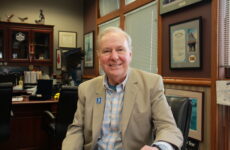Students know that college can be challenging at times. Whether it is due to it being someone’s first semester at college or simply having too much on one’s plate, school can make life chaotic at times.
DMACC provides many resources to help students who find themselves struggling in a number of ways, however some students do not know where to find help with their problems.
Located in Building One, various staff members are available to work with students and help them resolve problems. What students may not know, is that DMACC offers different types of help.
There are essentially three types of advising and counseling at DMACC: academic advising, counseling and navigators. But which kind of counselor do students need for which issue?
Academic advisors help students with the academic side of college. They work with scheduling issues, transfer plans and help students who find themselves falling behind in their studies. As an academic adviser, Deanne Heaton works with students who have questions or problems related to academic performance.
“Part of the counseling job is to do academic improvement plans. The majority of the students that I see always come in with: I was working too much and I got behind in my classes and couldn’t get caught up, or I got behind in my classes and did not use the Academic Achievement Center,” Heaton said.
Matt Sprengeler, another academic advisor, says that he sees the same issue of students struggling with scheduling. He said he often sees students try to both work full time and be a full-time student.
“If you are working more than 20 hours a week and you’re a typical student, you should not be a full-time student. Most of us can’t handle that much stuff, because college doesn’t happen at college,” Sprengeler said. “College is not what happens in the classroom. It’s what happens in the library, or at the coffee shop, or with your study group. College happens outside of DMACC.”
Next, there is counseling staff. Counselors are responsible for helping students deal with the non-academic side of college. They specialize in mental and emotional health related issues. If a student has a concern going on in their life, they can seek help from a counselor.
The counselors’ purpose are to listen and address the concerns of students. Many are either licensed social workers or have advanced education and training in mental health, psychology, or human development principles.
They can help if someone is experiencing depression or anxiety, struggling with substance abuse, or if they are just having a bad day.
They also work with students who are experiencing trouble with appetite, sleeping, adjusting to a new environment or concentration problems.
Rebekah Burhenn, an intern in DMACC’s counseling department, said in an email interview “Regardless of the reasons for attending college, lessons learned and obstacles overcome can provide opportunities for emotional growth and maturity. The college experience can also include issues and events that bring about overwhelming stress and psychological problems that affect the personal life and academic performance of the student. Counseling services are designed to assist students with both addressing difficulties encountered and promoting greater overall wellness.”
Lastly, there are counselors called navigators. They are a small collective of people who only work with students from DMACC’s industrial technology programs. Welding, CAD Technology, Nursing and Auto Mechanics are some examples of programs that have navigators. These positions are individually funded by the programs they serve.
They act as a mixture of both adviser and counselor for a specific program. Navigators work with a smaller body of students which allows them to provide more personalized assistance when it comes to determining a student’s needs.
“If you are a student in a program with one of those navigators, chances are you already know the navigator and you’re already working with them,” Sprengeler said.
Students need to know that if they are struggling or falling behind in classes there are people and resources here to help. The teachers and staff members at DMACC want to see students succeed and do well in college. If students feel uncomfortable meeting with someone in person, there are various helplines and links to websites to utilize on DMACC’s counseling page.
Students can schedule an appointment at the Ankeny campus with an adviser or counselor by calling 515-964-6200, or on a walk in basis.





Comments